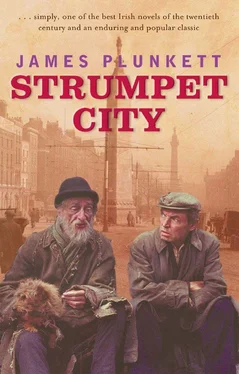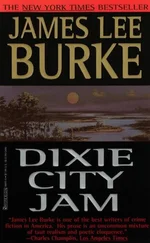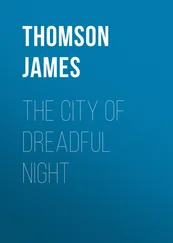‘The first thing you’d do if you found the Crown Jewels is buy grapes, isn’t that right?’ Rashers asked.
‘And go to France,’ Hennessy agreed.
‘The first thing I’d do is buy a tin whistle,’ Rashers said, ‘and stay where I bloody well am and play it.’
The belligerent note disappeared. His voice became gloomy. ‘And it’s not a lot to ask for, is it?’ he added. They were silent. Then Rashers looked up into the rain at the darkness of the sky.
‘Do you think Jesus Christ is up there?’ he asked.
‘And His blessed Mother,’ Hennessy affirmed, touching his hat.
‘Can he see us?’
‘That’s what the Penny Catechism says.’
‘Through the rain?’
‘I don’t think the rain makes any difference.’
They rose and faced the hallway. Above their heads all the windows, spaced out evenly in the flat face of the tenement, showed their late lamps. As they moved forward the dog stiffened and barked. They looked around. A tall figure approached, paused to pet the dog and said:
‘Good night, men.’
Each said good night in turn. The man passed on. Hennessy, his magpie eyes alight with information once again, gazed after the retreating figure. Then he turned to Rashers.
‘Do you know who that was?’
‘He was polite, anyway,’ Rashers said, pleased about the dog.
‘It was Jim Larkin,’ Hennessy said, delighted that he had so easily identified someone who was becoming the talk of Dublin.
CHAPTER SIX
The city faced the winter as best it could. It had its days of good weather, the freakish out-of-season days that always came to surprise it, as though a piece of summer had fallen from heaven out of its turn, days when the gulls looked whiter and the river wore a blue, chilled sparkle.
It was on such a day that Fitz took Mary to view the flat in Chandlers Court. He was uncertain how she would take it. She had hoped so much for a place of their own. But she realised it was best to make definite plans as soon as possible. Her own small capital was almost exhausted.
The hallway, even on so good a morning, looked grim enough. The staircase and the worn steps sagged and creaked as they climbed. But the rooms themselves were better. A large window overlooking the street gave glimpses of the mountains, now blue and bare, and admitted plenty of sunlight. Children at play in the street made sounds that were happy and tolerably distant. The large fireplace, with its marble surround left over from better days, gave plenty of room for cooking. A bedroom and a kitchenette completed the flat which, at four shillings and threepence a week was dearer, but then bigger, than average. The Kennys would be leaving in a week. When they reached the street again Mary said:
‘Well, what do you think?’
‘It suits me.’
She tightened her arm on his and said: ‘It’s a nice room but I wonder about the house.’
‘The people across the landing are all right.’
‘And above?’
‘I wouldn’t know.’
Mary considered. Then she said: ‘Let’s take it, Fitz.’
‘Good,’ he said, ‘we’ll take it next week.’
‘How can we do that?’
‘I can move in with Pat,’ Fitz said.
‘Won’t he mind?’
‘I don’t think so. It’s a bit dearer, but he isn’t happy about the place we’re in.’
Joe Somerville was with Pat when Fitz made the suggestion. Pat had lit the fire and was drying a pair of drawers.
‘It’s a dearer room,’ Fitz said, ‘but I’ll stand the extra.’
‘Why don’t you move in with the girl right away?’ Pat asked.
Fitz smiled and said: ‘Some people regard that as immoral.’
‘It wouldn’t deter me,’ Pat said.
‘We all know your tastes in the matter,’ Joe said sourly.
‘What do you mean?’
‘Down in Mabbot Street with Lily Maxwell.’
‘It isn’t in Mabbot Street.’
‘Then wherever it is. Fitz thinks more of himself than that.’
‘I don’t see what’s wrong with Lily Maxwell.’
‘Visiting the kip shops,’ Joe said, ‘when you get a skinful.’
‘It’s a very natural class of an occupation.’
‘It’s not Christian,’ Joe said.
‘I’ve never laid claim to being a Christian,’ Pat said, in a reasonable tone.
The steam from the drawers rose about his wrists and face and upwards towards the oil lamp on the box beside him.
‘You’ll crack the funnel of the lamp!’ Joe shouted.
He was low-sized and squat and worked for Nolan & Keyes with Pat. Pat moved the lamp back.
‘As a socialist,’ he explained, ‘I don’t regard marriage as necessary.’
‘The union of decent Christians has to be blessed by a priest,’ Joe insisted.
‘Who blessed the union of Adam and Eve, then?’ Pat asked. ‘Don’t tell me there was a priest.’
‘God did.’
‘Very well,’ Pat said, ‘let Fitz ask God to bless the union and go ahead. It won’t do any harm, and he’ll save a few bob.’
‘It was all right for Adam and Eve,’ Joe said, ‘but now the Church has the sacrament of marriage.’
‘A class of modern convenience,’ Pat said, ‘like the electric tram. If you want to know, it was the capitalists who invented marriage in order to protect the laws of inheritance.’
‘You’re too bitter altogether against religion,’ Joe said.
‘Maybe you’d have me like Keever, asking the office clerk to give him the stamps to save for the black babies.’
‘I suppose if he was collecting stamps for Karl Marx he’d be a hero,’ Joe snarled.
‘I’d be satisfied for a start if he began paying his subscription to the union.’
‘He’s only trying to help the missionaries.’
‘The missionaries do more harm than good.’
Exasperated, Joe appealed to Fitz.
‘There’s not a charitable drop in him,’ he accused.
‘Charity begins with my own class,’ Pat insisted.
‘And isn’t Keever your own class?’ Joe shouted.
‘No,’ Pat shouted back. ‘Because he’s against us. He that is not with me is against me.’
‘Now he has the bloody nerve to quote the Bible at me,’ Joe protested.
Fitz said: ‘For God’s sake stop talking like a pair of public meetings.’
They both glared at each other in silence.
‘I’m getting married at Easter,’ Fitz said, ‘and I’m asking if you’ll move in with me so that I can hold on to the flat when it’s left empty. If you don’t want to do that, say so.’
‘Of course I’ll move in with you,’ Pat said, ‘if you haven’t got the courage to go against the institutions of capitalist society.’
‘I haven’t. Does that satisfy you?’
‘It doesn’t,’ Pat said, ‘but I’ll have to put up with it, I suppose.’
He felt the drawers and judged them to be dried out enough to hang on a line that stretched from the bedpost to the corner of the fireplace. He drew the legs down so that they hung at full length.
‘They’re nearly as holy as Keever himself,’ he remarked.
Joe opened his mouth but had to close it again. He could think of nothing to say.
Winter took a heavy toll of life in the parish of St. Brigid, where the old succumbed to the usual diseases. Parish duties kept Father O’Connor busy. People asked for the priest, were anointed, and left the overcrowded rooms for whatever place God and their way of living had prepared for them. He found the dirt and the poverty hard to get used to. Even the room he slept in joined forces with the weather and fell in league with the district that surrounded it. There were damp spots on the wall and damp patches on the painting of Our Lady of Sorrows. When the window was open the noise of trains and traffic was unbearable; when it was closed the room became musty and unpleasant. The iron-framed bed was a double one, unpriestly and lonely. Father Giffley continued to be boorish and unfriendly.
Читать дальше












